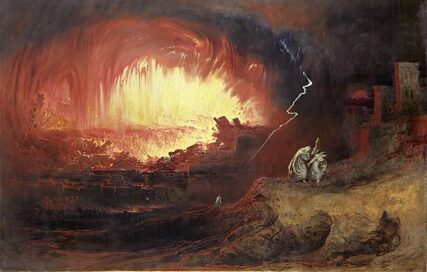(RNS) — It was precisely at this season in 1938. It was the day after Kristallnacht, “the night of broken glass,” when Nazis rampaged through Germany and Austria, destroying Jewish homes, businesses and synagogues.
A group of men were in a jail cell — among them, a young rabbinical student, Emil Fackenheim, who was destined to become one of modern Judaism’s most important thinkers.
One of the older men approached him and said to him: “You! Fackenheim! You are a student of Judaism! Tell us, what does Judaism have to say to us right now?”
Right now, in the wake of the news that has left so many of us shattered, we are asking ourselves the same question. What can Judaism — and more precisely, the Bible and its commentaries — say to us at this moment of existential dread?
I turn to this week’s Torah portion — to the story of Abram and Sarai, the first Jews, who will become Abraham and Sarah — to read of their migration, along with their extended family, from Haran to the land of Israel.
Almost immediately after their arrival in the land of Israel, there is a split in the family — the first division in Jewish history. Abram splits with his nephew, Lot. Abram settles in the south; Lot settles in the “plain of the Jordan — this was before the Eternal had destroyed Sodom and Gomorrah — all the way to Zoar, like the garden of the Eternal, like the land of Egypt.”
There you have it: Lot was seeking comfort and prosperity and he settled in Sodom.
What was so bad about Sodom and Gomorrah? Centuries of biblical interpretation, and perhaps some misinterpretations, have taught us that the sins were of a sexual nature — perhaps, homosexual gang rape.
But that is not how the earliest commentators imagined the sins of Sodom and Gomorrah to have been.
How did the Prophet Ezekiel see it?
Only this was the sin of your sister Sodom: arrogance! She and her daughters had plenty of bread and untroubled tranquility; yet she did not support the poor and the needy. (Ezekiel 16:49)
The ancient sages agreed. They expanded upon Ezekiel’s interpretation and invented their own stories about the moral failings of Sodom. (Many of these can be found, in abridged form, in the classic anthology of rabbinic lore, “The Book of Legends.”)
The sages taught that the people of Sodom were selfish. They passed laws that made it illegal to give charity to anyone. One legend says that when a beggar would wander into Sodom, the people would mark their names on their coins and each of them would give him a coin. But no one would sell him bread. When he died of hunger, everyone would come and go through his pockets, and they would take their coins.
The sages taught that the people of Sodom created laws that demeaned women. There were four judges in Sodom, each named for their actions: Shakrai (“liar”), Shakrurai (“habitual liar”), Zayfai (“forger”) and Matzlei Dina (“perverter of justice”). They ruled that if someone strikes the wife of another and causes her to miscarry, the woman’s husband should give her to the assailant, so he can impregnate her again.
The sages taught that the people of Sodom perverted justice. Eliezer, servant of Abraham, happened to visit that city and they wounded him. He came before the judge to seek compensation. The judge said to him: “You should not be seeking compensation! Rather, you should be paying the man who wounded you. When he cut you, he was engaged in the medical art of bloodletting!”
The sages taught that the people of Sodom believed in radical, stifling conformity. When people stayed in the town’s inns, they would be forced to lie in beds of a certain length. When guests were taller than the length of the bed, the innkeeper would cut them to fit the bed, and when guests were shorter than the bed, the innkeeper would stretch them. (This is a Jewish version of the Greek legend of the Procrustean bed).
The sages taught that the people of Sodom were sadistic. A young woman fed the poor in secret. The authorities decreed the girl be covered with honey. They put her on top of the walls of the city, and they left her there until bees came and stung her and she died. The Book of Genesis says that the cries of Sodom had ascended to God. Which cries? the sages ask. It was that poor young woman’s cries — covered with honey, being attacked by killer bees. Her cries ascended to God, and for that reason, God realized the sins of Sodom had simply gone on too long.
The sages taught that the people of Sodom were radically individualistic. In Pirkei Avot, the ethics of the ancient sages, we find:
There are four types of character in human beings:
The one that says: “Mine is yours and yours is mine” is an unlearned person. The one that says: “Mine is yours and yours is yours” is a pious person. The one that says: “Mine is mine, and yours is mine” is a wicked person. The one that says: “Mine is mine, and yours is yours”: this is a commonplace type; and some say this is the kind of person who lived in Sodom.
In other words: “Leave me alone. I’ve got mine, and you’ve got yours, and that is all that really matters. Let us retreat into our own bubbles.” This morning, I am hearing many people saying something akin to that — “I will not be personally affected by this.”
That is precisely the wrong way to think about this. We are all strands in one huge tallit, and if you pull on one thread, it all unravels.
Each of those legends are about social and political trends that could emerge in America under a Trump presidency. Many of them are already occurring.
Will God rain fire and brimstone upon America for its failings?
No. What I am saying is this: The ancient sages knew what happens to societies that are on the decline. They knew you would not need fire and brimstone from the heavens; the consuming fires would come from within the societal structure, itself.

“The Destruction of Sodom And Gomorrah” by John Martin. Public Domain, courtesy of Wikipedia
I used to love this story, told by the late Elie Wiesel. A righteous man came to Sodom and pleaded with the people to change their ways. No one listened.
Finally, he sat in the middle of the city and simply screamed.
Someone asked him: “Do you think that will change anyone?”
“No,” said the righteous man. “But at least, by screaming, I know that they will not change me.”
Why “used to love this story”? Because solitary screaming in the town square is a self-indulgent luxury that we can now ill afford. It is not enough to simply scream so it makes you feel better, so society will not change you. We will need the kind of screaming that will take the form of serious resistance to a regime that has every potential to traffic in fascist ideas and actions, and that has promised to be authoritarian.
I conclude by recalling Lot’s wife, who in the wake of the destruction of Sodom, turned around for one last look, and turned into a pillar of salt.
Is that us, now? Are we turning to look back on what was our lives, risking our collective transformation into pillars of salt?
Or, is that the new administration — turning to look back at an imagined, idealized past (the 1950s? the 1930s?), as the entire nation turns into a pillar of salt?
The late David Bowie sang: “This is not America.”
But it is. America has become a place where a majority of voters were totally OK with the fascistic tendencies, the misogyny, the racism and the politics of cruelty.
What will we — people of faith who are committed to democratic values — do about it?
You Might Also Like
New book calls for authentic engagement and equity in organizations
The Nine Asks by Kimberly Danielle Organizations have a responsibility to ensure that people who come there to work, worship,...
‘Holy Hurt’ is Hillary McBride’s field guide to the shattering impact of spiritual trauma
(RNS) — Trauma is a lot like having a shard of glass in your hand, explains clinical psychologist Hillary McBride....
So You Married a Priest? + Beth Allison Barr
It’s ministry by marriage. Did you know there are piles of guidebooks meant to help women excel at...
Abyssinian Baptist Church welcomes dismissal of pastor candidate’s discrimination suit
(RNS) — A federal judge has dismissed a gender discrimination lawsuit brought against Abyssinian Baptist Church by a onetime candidate...










